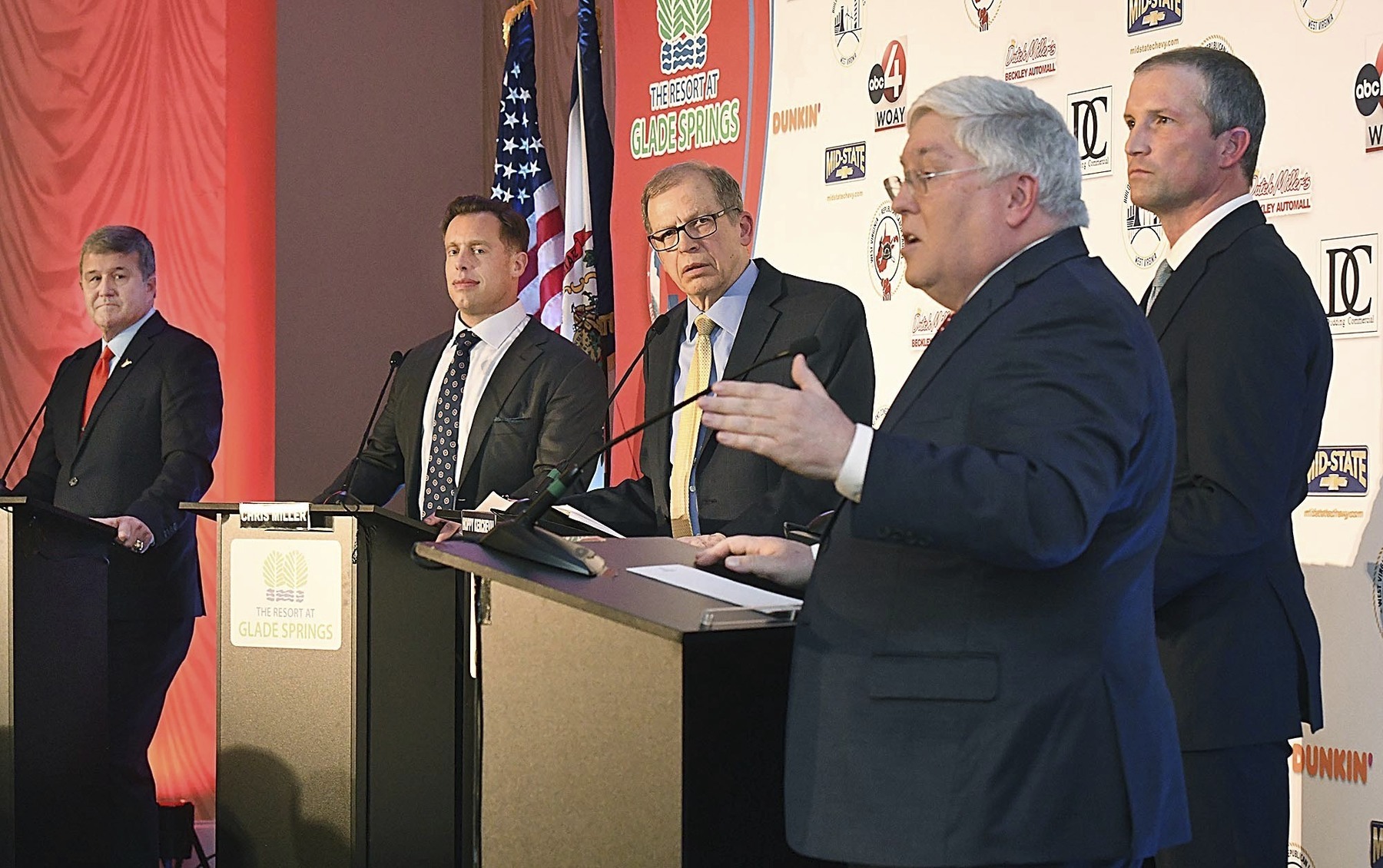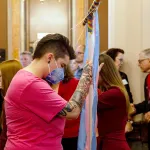The Republicans vying to be governor of West Virginia are trying to outdo one another on how much they aim to restrict LGBTQ+ rights, with transgender individuals specifically in their bull’s-eye.
Ahead of the state’s May 14 primary elections, the two candidates leading the GOP field are Patrick Morrisey, the current attorney general, and Moore Capito, who resigned from the West Virginia House of Delegates at the end of last year to focus on his bid to be the state’s top executive.
Recent independent polling shows Morrisey and Capito neck and neck, with Chris Miller, the owner of a chain of car dealerships, in a distant third place, followed by Mac Warner, the current secretary of state.
All four candidates — all White, cisgender, straight men — are fervent backers of former Republican President Donald Trump, who won the state by more than 38 points in 2020 and remains highly popular. With little daylight between them on guns (they love them) and immigration (securing the U.S.-Mexico border some 1,500 miles away is often cited as a top failure of Democratic President Joe Biden), the final weeks of the gubernatorial contest have featured a series of one-upmanship ads about who will be the most anti-trans governor.
The ads have accused rivals of supporting LGBTQ+ people while private citizens and criticized the records of those who have held elected positions for being insufficiently committed to restricting LGBTQ+ rights. One particularly harsh ad supporting Morrisey suggests being LGBTQ+ is a slur.
At least 589 pieces of anti-trans legislation were considered by lawmakers at various levels of state and federal government last year, according to an analysis by the Trans Legislation Tracker, representing what the group called “an escalation against transgender people at both the state and national levels.” Most bills were in deep red states. Wyoming attempted to make the provision of gender-affirming care to minors a form of child abuse; Oklahoma considered a ban on gender-affirming care up to 26 years of age.
A poll conducted last year by Survey Monkey for The 19th showed that just 17 percent of Americans — and only 29 percent of Republicans — believe that politicians should focus on restricting access to gender-affirming care. GOP politicians in West Virginia and elsewhere — including in the Republican presidential primary — have nevertheless made pushing anti-trans policies central to their campaigns, seeing it as a way to communicate their political identity to the most fervently anti-LGBTQ+ portion of the Republican base.
An analysis done in early April of the West Virginia governor’s race by AdImpact Politics, which tracks political advertising, showed that nearly $14 million had been spent on ads related to the GOP candidates and that the most-mentioned issue was support for Trump. Morrisey led in ad support, with about $7.3 million spent to bolster his chances by his campaign or other groups. Miller, the son of GOP U.S. Rep. Carol Miller, was next, with about $3.6 million. Capito, the son of Republican U.S. Sen. Shelley Moore Capito, rounded out the top tier with about $1.5 million, the analysis showed.
After Trump, the second-most-mentioned issue was LGBTQ+ rights — specifically, ads touting the candidates’ attempts to restrict them or leveling accusations that their opponents have done too little.

We made it our business
…to represent women and LGBTQ+ people during this critical election year. Make it yours. Support to our nonprofit newsroom during our Spring Member Drive, and your gift will help fund the next six months of our politics and policy reporting. Can we count on you?
Morrisey, as attorney general, has often attempted to use litigation to limit the ability of LGBTQ+ individuals to fully participate in public life. In 2019, when the case Bostock v. Clayton County reached the U.S. Supreme Court, Morrisey filed a friend-of-the-court brief backing the Trump administration’s position that Title VII of the 1964 Civil Rights Act does not protect workers from discrimination on the basis of sexual orientation or gender identity. The high court disagreed in a 6-to-3 ruling. Just in the past couple of weeks, Morrisey has pledged to appeal to the Supreme Court rulings that allowed a transgender girl to compete on her middle school’s sports teams and one that determined the state’s Medicaid health insurance program had to pay for gender-affirming surgeries. (Some treatments are covered and not at issue in the litigation.)
A recent ad run by Black Bear PAC, which supports Morrisey’s candidacy, charged that when Miller was on the board of a state university he “looked the other way as pro-transgender events happened on his watch.” It shows a man in women’s clothing, makeup and a blonde wig. The captions are framed in rainbow colors associated with the Pride flag. “Chris Miller protected they/them, not us,” the narrator states.
An ad made by Miller’s campaign, meanwhile, features a high school student who says that when she went to the locker room to change for dance practice “there was a boy in there, he’s trans, he would go in there every day and just watch.” “There was a politician that claimed to have our back for a minute,” the girl’s mother said, referring to Morrisey. “He’s not a strong man, we need a strong man, with a strong voice and he’s not that.”
Capito, like his mother, has at times taken positions that support LGBTQ+ rights. In 2019, for example, he sponsored a bill that would ban conversion therapy for LGBTQ+ minors — efforts to change someone’s sexual orientation through a process not backed by science or supported by major medical associations. But in ads he too has touted his anti-trans record. In a recent one, Capito reminds voters he “wrote the bill banning puberty blockers for children while Morrisey got rich lobbying for the puberty blocker companies.” Morrisey’s past work for private-sector clients included some in the pharmaceutical and health care industries.
The anti-trans focus from the three leading GOP gubernatorial race prompted a rebuke last week from the editorial board at the Dominion Post, the daily newspaper in Morgantown, home to West Virginia University and the state’s third-most populous city. “Three of the top GOP candidates for West Virginia governor have been running almost exclusively anti-transgender ads for well over a month,” the editorial stated, noting that just 0.4 percent of the state’s adult population identifies as transgender. “This is an infinitesimal amount of our populace, yet these three gubernatorial candidates have based their campaigns on punching down at this minority. Specifically, going after literal children.”
The 19th’s queries to the campaigns of Capito and Miller were not answered. Morrisey’s campaign provided a statement that read: “Morrisey has consistently advocated for women and girls to have access to womens-only sports and spaces. Morrisey has never in his life worked to advance any kind of policies that promote transgender ideology. Morrisey is going to continue being the champion for women when he is elected Governor.”
All have shown a reluctance to speak with the news media about their candidacies. Of the four contenders, for example, only Warner participated in a candidate issues forum with the Mountain State Spotlight — Morrisey, Capito and Miller did not sit for an interview or respond to the nonprofit news organization’s candidate questionnaire.
In a recent poll of West Virginia’s Republican voters, more than half said that the economy was the most important issue facing the state, followed by the quality of education, health care, immigration, and energy and coal issues. The Dominion Post editorial lamented that with the candidates focused on being the most anti-trans, these issues have gotten very little oxygen in the Republican gubernatorial primary.
A Republican is heavily favored to win the governor’s race in the general election. The only Democrat in contention is Steve Williams, the mayor of Huntington, the state’s second-largest city. Early voting is already underway and ends May 11.







